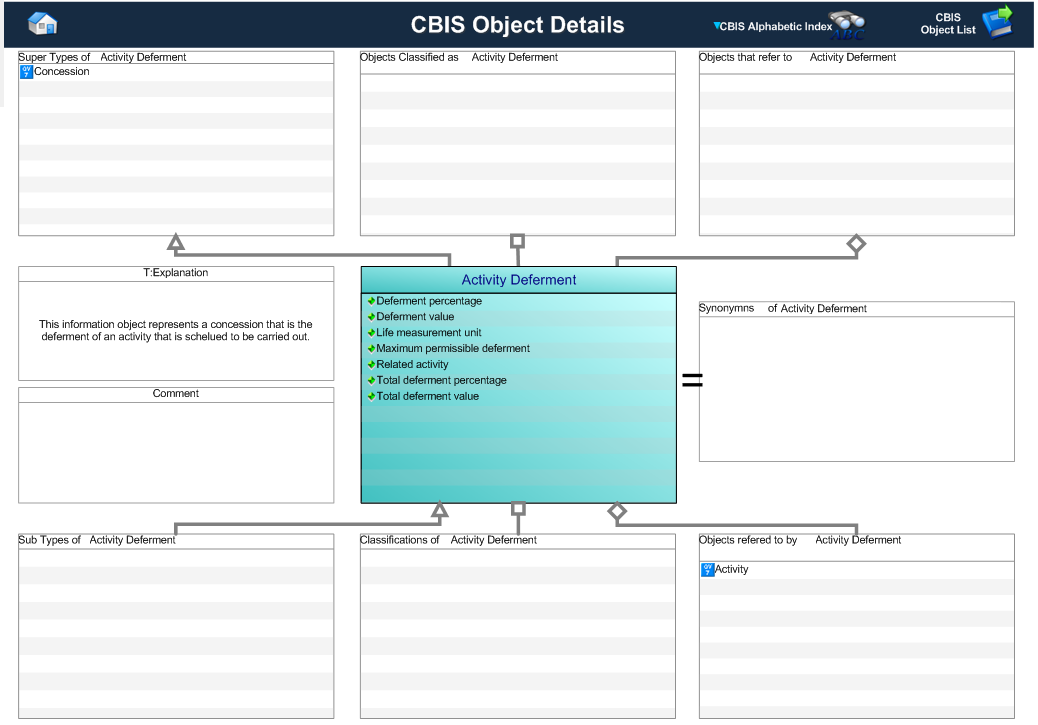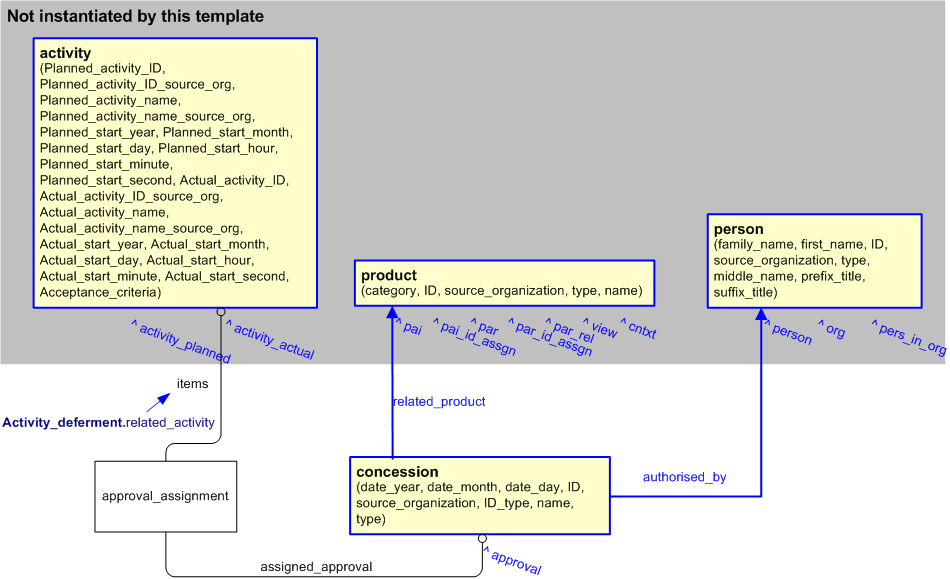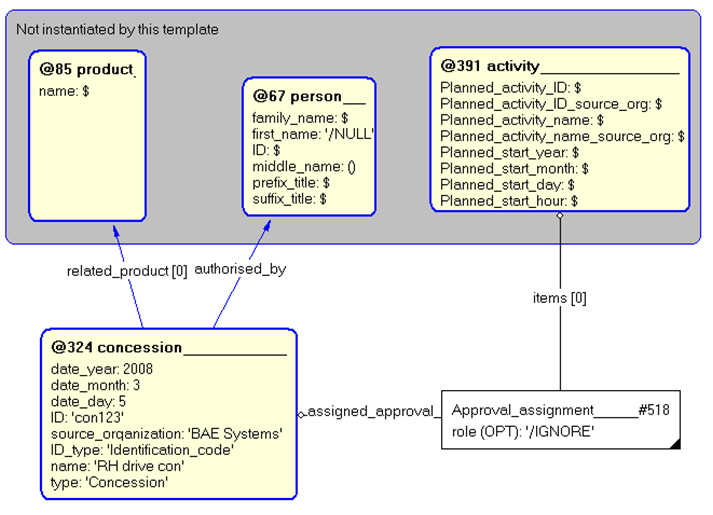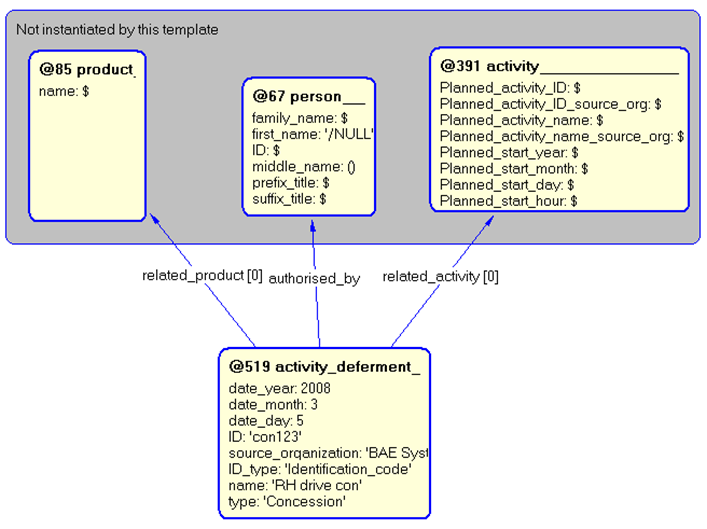Template:— activity_deferment (act_def)
Context:— UK_Defence |
Date: 2010/03/15 14:22:40
Revision: 1.2
|
This section specifies the template activity_deferment.
NOTE
The template has been defined in the context of
UK_Defence.
Refer to the business context for details of related templates.
NOTE
An explanation of a template and the associated instantiation path is
provided in the
Template overview
section.
This template describes how to represent a UK_Defence activity_deferment, using
Approval.
This information object represents a concession that is the deferment of an
activity that is schelued to be carried out
This information object represents a concession that is the deferment of an
activity that is schelued to be carried out
Figure 1 — Graphical Representation for Business Object Activity Deferment
Record:
The definition of a Activity Deferment object is:
This information object represents a concession that is the deferment of an
activity that is schelued to be carried out
|
Attribute name
|
Attribute description
|
Attribute type
|
Optionality
|
| Deferment percentage |
The percentage deferment authorised by this activity deferment. No map; see issue log |
Intrinsic |
Mandatory |
| Deferment value |
The value of the derferment authorised by this activity deferment.No map; see issue log |
Intrinsic |
Mandatory |
| Life measurement unit |
The name of the life measurement unit. e.g. FLYING HOURS. No map; see issue log |
Intrinsic |
Mandatory |
| Maximum permissible deferment |
Maximum allowed deferment of activity execution. No map; see issue log |
Intrinsic |
Mandatory |
| Related activity |
This is the reference to the activity that is deferred. |
Activity |
Mandatory |
| Total deferment percentage |
The total percentage of all activity deferments, including ths one. No map; see issue log |
Intrinsic |
Mandatory |
| Total deferment value |
The total value of all activity defermentss, including this one. No map; see issue log |
Intrinsic |
Mandatory |
Table 1 — Activity Deferment attribute details
The EXPRESS-G diagram in
Figure
2
shows the templates and EXPRESS entities that are required
to represent the template
"activity_deferment".
The text highlighted in blue shows the template parameters.
Figure 2 — An EXPRESS-G representation of the Information model for activity_deferment
The graphic for the template to be used in other EXPRESS-G diagrams
is shown in Figure
3
below.
Figure 3 — The graphical representation of the activity_deferment template
The following input parameters are defined for this template:
This is the reference to the person that authorized the concession.
Year_component of the date on which the concession is defined to start
Month_component of the date on which the concession is defined to start
Day_component of the date on which the concession is defined to start
This is the identifier of the concession.
The organization that created the associated identifier. Additionally
a Person or Information System could be defined when either of these are the source; see Identifier template characterizations
This is the name of the type of the class used to classify the identifier and so
provide the role or reason for the identification.
The following classes and their sub-classes can be used:
This is the name of the concession.
This is the reference to the product(s) for which the concession has been raised
type (Default=Concession,Type='CLASS')
The type of the concession.
The following classes and their sub-classes can be used:
classifications:
"Concession"
(urn:plcs:rdl:std:Concession),
[Deferment]![[warning:]](../../../../../../images/dex/warning.gif) Error RDL4: The URI urn:plcs:rdl:uk_defence is not listed in dexlib/data/refdata/rdl_index.xml[Dispatch_deviation]
Error RDL4: The URI urn:plcs:rdl:uk_defence is not listed in dexlib/data/refdata/rdl_index.xml[Dispatch_deviation]![[warning:]](../../../../../../images/dex/warning.gif) Error RDL4: The URI urn:plcs:rdl:uk_defence is not listed in dexlib/data/refdata/rdl_index.xml
Error RDL4: The URI urn:plcs:rdl:uk_defence is not listed in dexlib/data/refdata/rdl_index.xml
The reference to the activity that is deferred.
The following reference parameters are defined for this template:
Allow the
Approval
entity instantiated in this path to be referenced when this template is used.
Note: The
Approval
entity can be referenced in a template path by:
%^target = $activity_deferment.approval%
where
target
is the parameter to which the
Approval
is bound.
The following parameter combinations specify a uniqueness constraint:
Unique constraint: Unique id
Each instance of the
entity
(
Approval)
within the data set shall be uniquely identified
by a combination of the following parameters on this
template (activity_deferment) namely:
ID,
name,
type.
The
instance is
referenced by the following template parameter:
approval.
The instantiation path shown below specifies the entities that are to be
instantiated by the template.
A description of templates and the syntax for the instantiation path is
provided in the
Templates Help/Information section.
The following entities are instantiated with attributes as specified:
The instance diagram in Figure
4
shows an example of the EXPRESS entities and templates that are instantiated by the template:
/activity_deferment(authorised_by='#67', date_year='2008', date_month='3', date_day='5', ID='con123', source_organization='BAE Systems', ID_type='Identification_code', name='RH drive con', related_product='#85', type='Concession', related_activity='#391')/
(an illustration of the consolidated activity_deferment template is shown in
Figure
5 below.)
Figure 4 — Entities instantiated by activity_deferment template
The instance diagram in
Figure
5
shows the graphic symbol for the template that is to be
used in other instance diagrams. The example template is:
/activity_deferment(authorised_by='#67', date_year='2008', date_month='3', date_day='5', ID='con123', source_organization='BAE Systems', ID_type='Identification_code', name='RH drive con', related_product='#85', type='Concession', related_activity='#391')/
Figure 5 — Instantiation of activity_deferment template
Characterizations
No common characterizations of the template
activity_deferment
have been identified. However, the ISO 10303-239 EXPRESS model
may enable other assignments to the entities instantiated by the template.




